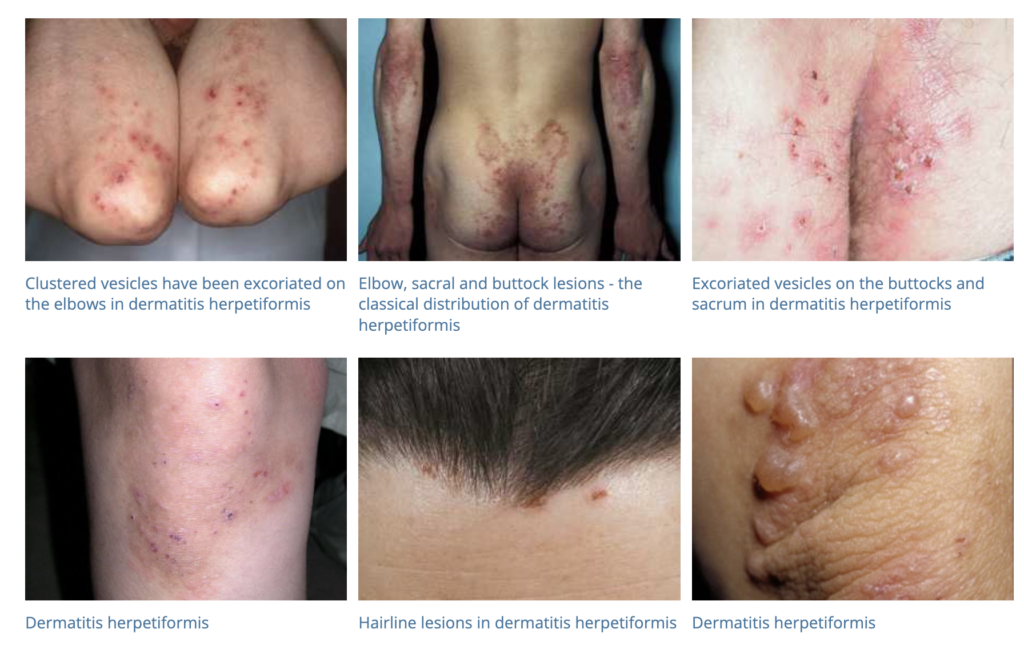Coeliac disease is an immune-mediated disorder triggered by the ingestion of gluten, a protein found in wheat, barley, and rye, in genetically predisposed individuals. This condition leads to inflammation and villous atrophy in the small intestine, impairing nutrient absorption.
Causes:
- Genetic Predisposition: Strongly associated with HLA-DQ2 and HLA-DQ8 haplotypes.
- Environmental Factors: Introduction of gluten in the diet and gastrointestinal infections may trigger the onset in genetically predisposed individuals.
Diagnosis:
- History (Hx):
- Symptoms: Classic symptoms include diarrhoea, bloating, weight loss, malabsorption (e.g., steatorrhea), and abdominal pain. Some may have atypical symptoms like anemia, fatigue, or joint pain.
- Family History: Coeliac disease can have a genetic component, so a family history of the disease is relevant.
- Associated Conditions: Type 1 diabetes, autoimmune thyroiditis, Down syndrome, Turner syndrome, and other autoimmune disorders.
- Physical Examination (Ex):
- General Examination: May reveal signs of malnutrition, such as muscle wasting.
- Dermatologic Exam: Look for dermatitis herpetiformis, a skin manifestation of coeliac disease.
- Abdominal Exam: To assess for distension, pain, or other gastrointestinal symptoms.
- Investigations (Ix):
- Serologic Tests:
- Anti-Tissue Transglutaminase Antibodies (tTG-IgA): is the primary screening test.
- Endomysial Antibodies (EMA-IgA): highly specific but expensive
- Deamidated Gliadin Peptide Antibodies (DGP-IgA and DGP-IgG)
- Total Serum IgA: Total serum IgA should be checked as IgA deficiency is more common in coeliac disease.
- Endoscopy with Small Bowel Biopsy: Gold standard for diagnosis. Shows characteristic villous atrophy, crypt hyperplasia, and intraepithelial lymphocytosis.
- HLA Typing: Can be used to rule out the disease, as the absence of HLA-DQ2 and HLA-DQ8 virtually excludes coeliac disease.
- Serologic Tests:
Differential Diagnosis (DDx):
- Irritable Bowel Syndrome (IBS): Similar gastrointestinal symptoms but no gluten sensitivity.
- Inflammatory Bowel Disease (IBD): Like Crohn’s disease or ulcerative colitis.
- Lactose Intolerance: Similar gastrointestinal symptoms triggered by lactose.
- Small Intestinal Bacterial Overgrowth (SIBO): Can mimic symptoms of coeliac disease.
- Wheat Allergy: An allergic response to wheat that is different from the autoimmune response seen in coeliac disease.
Management (Mx):
- Dietary Management:
- Gluten-Free Diet (GFD): Lifelong adherence to a GFD is the mainstay of treatment. This includes avoiding all foods containing wheat, barley, and rye.
- Nutritional Counseling: To ensure a balanced diet and avoid nutritional deficiencies.
- Monitoring for Gluten Exposure: Education about reading food labels and awareness of hidden sources of gluten.
- Medical Management:
- Supplementation: For nutritional deficiencies (e.g., iron, calcium, vitamin D, B12, folate).
- Follow-up Serology: To monitor adherence to a GFD and response to treatment.
- Dermatitis Herpetiformis: Treated with dapsone and a strict GFD.
- Monitoring and Follow-Up:
- Regular Follow-Up: To monitor adherence to diet, symptom resolution, and check for complications.
- Bone Density Screening: Due to increased risk of osteoporosis.
- Periodic Screening for Associated Conditions: Such as thyroid disease and type 1 diabetes.
- Patient Education: About the disease, the importance of adherence to a GFD, and how to manage cross-contamination risk.
Successful management of coeliac disease primarily revolves around dietary modifications and supportive care to address any nutritional deficiencies. Collaboration with dietitians and gastroenterologists can be beneficial for comprehensive care. Regular follow-ups are crucial for monitoring the disease course and dietary adherence.

